Cultural Care: Improving Healthcare Outcomes for Maori Clients in NZ
VerifiedAdded on 2023/01/17
|7
|1539
|83
Essay
AI Summary
This essay examines the critical importance of cultural care when providing healthcare to Maori clients in New Zealand. It highlights the diverse ethnic landscape of the country and the significance of cross-cultural understanding among medical practitioners. The essay emphasizes the disparities in health outcomes between Maori and non-Maori populations, particularly in areas like cancer and palliative care. It explores the role of palliative care in supporting Maori patients and their Whanau (family) during chronic and life-limiting illnesses, considering the increasing number of older Maori and the shift towards community-based care. The essay stresses the importance of effective communication, patient advocacy, and culturally sensitive approaches to end-of-life decisions, including the use of advanced directives and pain management. It underscores the need for medical practitioners to consider cultural beliefs and values to improve patient outcomes and build trusting relationships. The essay references various studies and research papers to support its arguments, offering insights into the challenges and best practices in providing culturally appropriate healthcare to Maori clients.
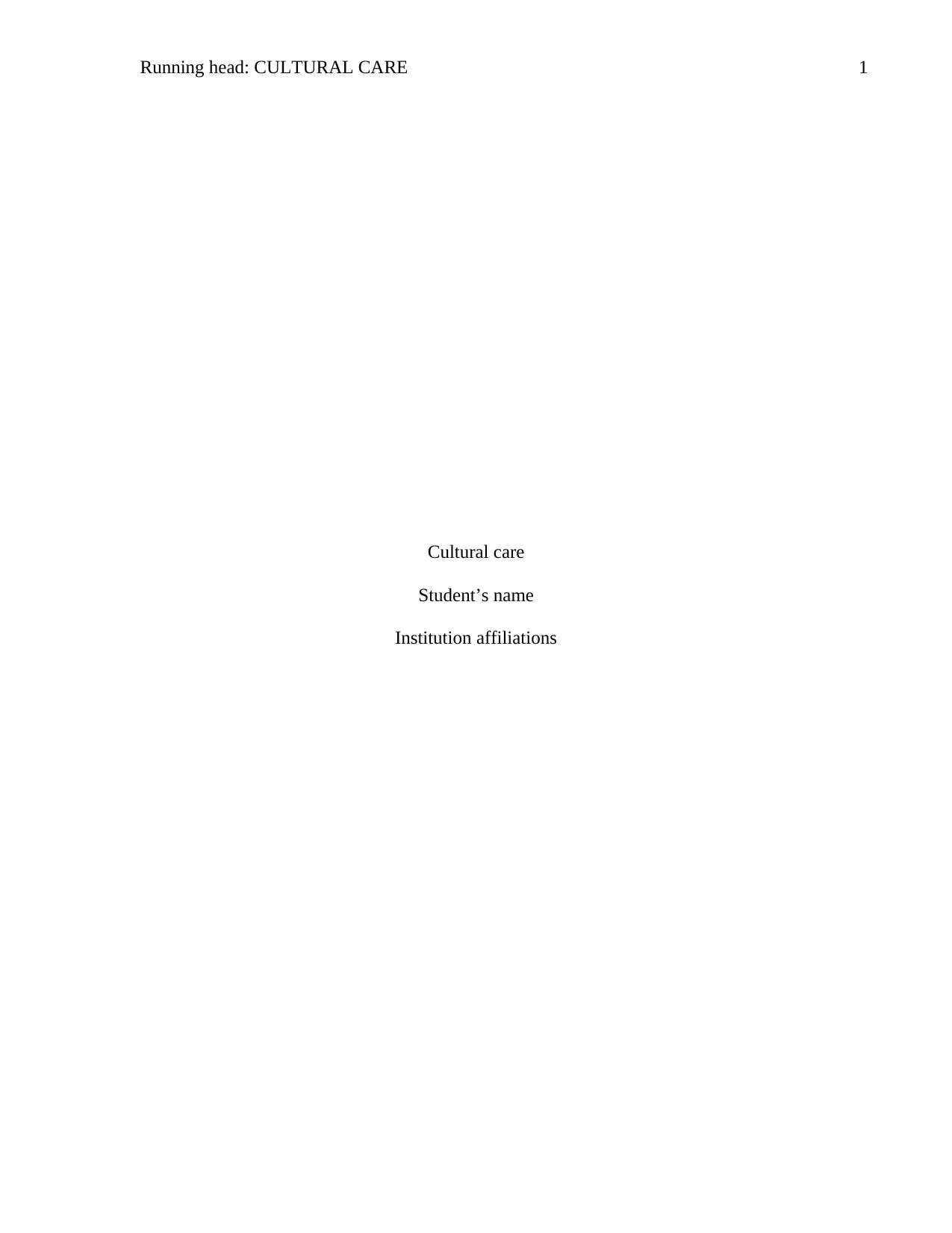
Running head: CULTURAL CARE 1
Cultural care
Student’s name
Institution affiliations
Cultural care
Student’s name
Institution affiliations
Paraphrase This Document
Need a fresh take? Get an instant paraphrase of this document with our AI Paraphraser
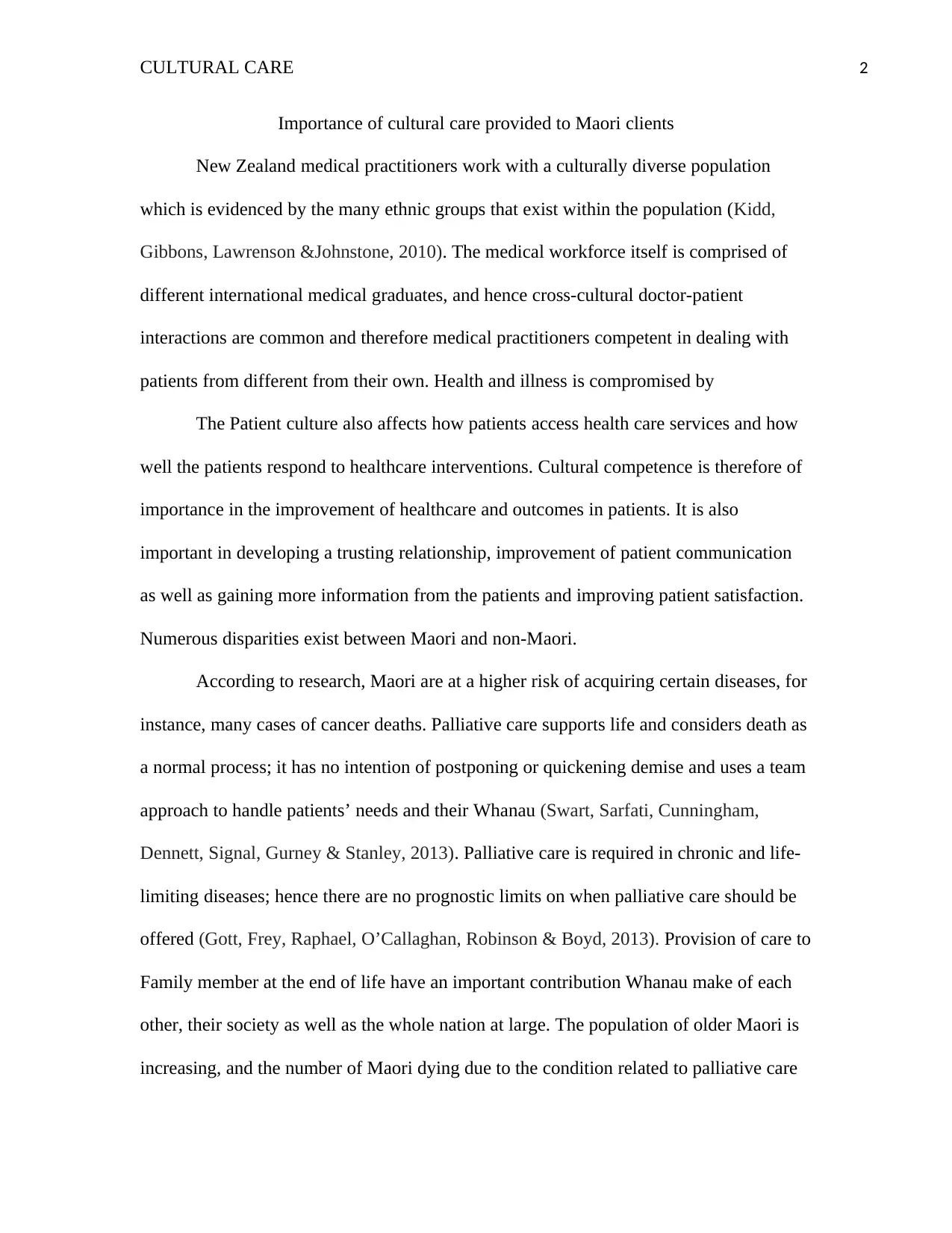
CULTURAL CARE 2
Importance of cultural care provided to Maori clients
New Zealand medical practitioners work with a culturally diverse population
which is evidenced by the many ethnic groups that exist within the population (Kidd,
Gibbons, Lawrenson &Johnstone, 2010). The medical workforce itself is comprised of
different international medical graduates, and hence cross-cultural doctor-patient
interactions are common and therefore medical practitioners competent in dealing with
patients from different from their own. Health and illness is compromised by
The Patient culture also affects how patients access health care services and how
well the patients respond to healthcare interventions. Cultural competence is therefore of
importance in the improvement of healthcare and outcomes in patients. It is also
important in developing a trusting relationship, improvement of patient communication
as well as gaining more information from the patients and improving patient satisfaction.
Numerous disparities exist between Maori and non-Maori.
According to research, Maori are at a higher risk of acquiring certain diseases, for
instance, many cases of cancer deaths. Palliative care supports life and considers death as
a normal process; it has no intention of postponing or quickening demise and uses a team
approach to handle patients’ needs and their Whanau (Swart, Sarfati, Cunningham,
Dennett, Signal, Gurney & Stanley, 2013). Palliative care is required in chronic and life-
limiting diseases; hence there are no prognostic limits on when palliative care should be
offered (Gott, Frey, Raphael, O’Callaghan, Robinson & Boyd, 2013). Provision of care to
Family member at the end of life have an important contribution Whanau make of each
other, their society as well as the whole nation at large. The population of older Maori is
increasing, and the number of Maori dying due to the condition related to palliative care
Importance of cultural care provided to Maori clients
New Zealand medical practitioners work with a culturally diverse population
which is evidenced by the many ethnic groups that exist within the population (Kidd,
Gibbons, Lawrenson &Johnstone, 2010). The medical workforce itself is comprised of
different international medical graduates, and hence cross-cultural doctor-patient
interactions are common and therefore medical practitioners competent in dealing with
patients from different from their own. Health and illness is compromised by
The Patient culture also affects how patients access health care services and how
well the patients respond to healthcare interventions. Cultural competence is therefore of
importance in the improvement of healthcare and outcomes in patients. It is also
important in developing a trusting relationship, improvement of patient communication
as well as gaining more information from the patients and improving patient satisfaction.
Numerous disparities exist between Maori and non-Maori.
According to research, Maori are at a higher risk of acquiring certain diseases, for
instance, many cases of cancer deaths. Palliative care supports life and considers death as
a normal process; it has no intention of postponing or quickening demise and uses a team
approach to handle patients’ needs and their Whanau (Swart, Sarfati, Cunningham,
Dennett, Signal, Gurney & Stanley, 2013). Palliative care is required in chronic and life-
limiting diseases; hence there are no prognostic limits on when palliative care should be
offered (Gott, Frey, Raphael, O’Callaghan, Robinson & Boyd, 2013). Provision of care to
Family member at the end of life have an important contribution Whanau make of each
other, their society as well as the whole nation at large. The population of older Maori is
increasing, and the number of Maori dying due to the condition related to palliative care
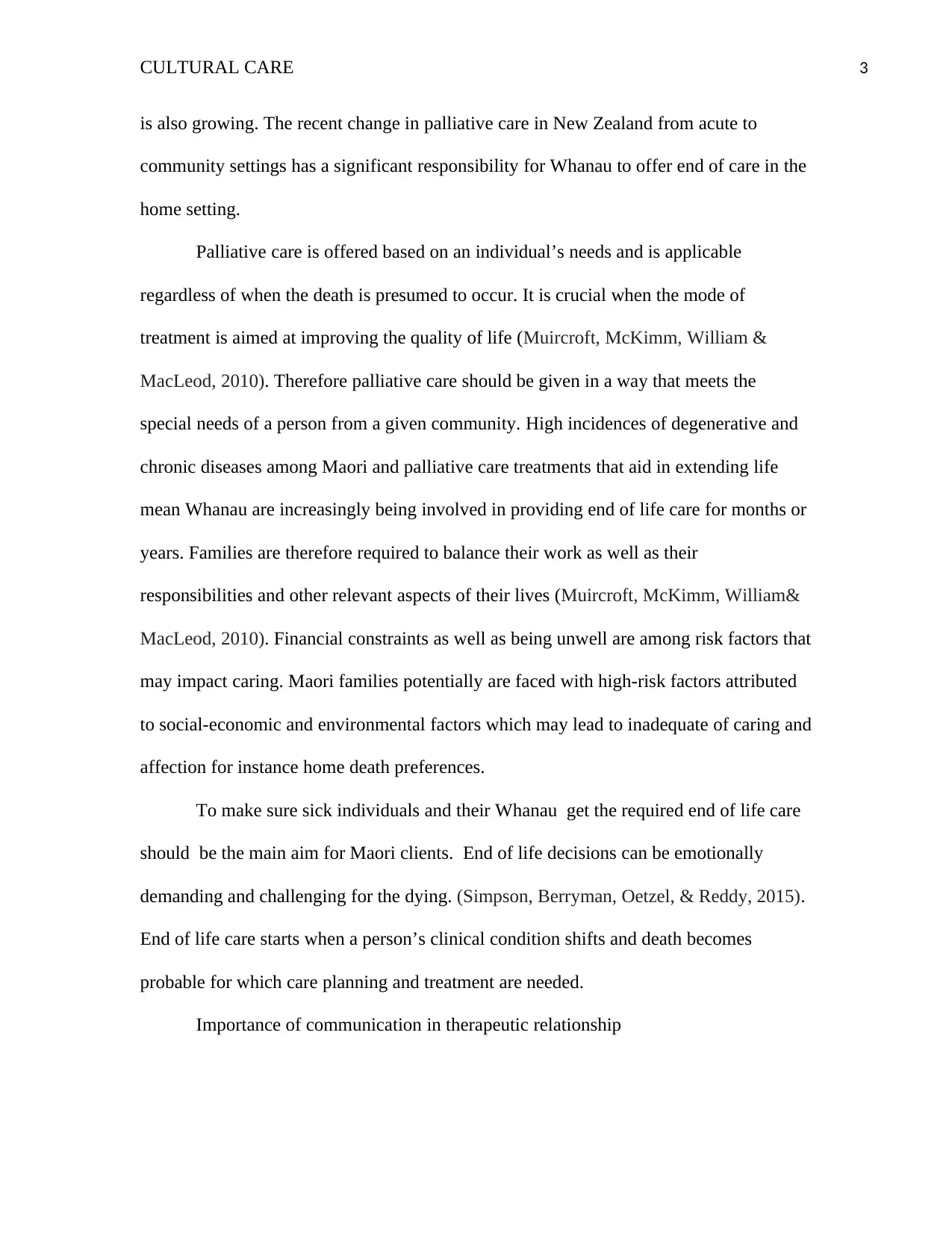
CULTURAL CARE 3
is also growing. The recent change in palliative care in New Zealand from acute to
community settings has a significant responsibility for Whanau to offer end of care in the
home setting.
Palliative care is offered based on an individual’s needs and is applicable
regardless of when the death is presumed to occur. It is crucial when the mode of
treatment is aimed at improving the quality of life (Muircroft, McKimm, William &
MacLeod, 2010). Therefore palliative care should be given in a way that meets the
special needs of a person from a given community. High incidences of degenerative and
chronic diseases among Maori and palliative care treatments that aid in extending life
mean Whanau are increasingly being involved in providing end of life care for months or
years. Families are therefore required to balance their work as well as their
responsibilities and other relevant aspects of their lives (Muircroft, McKimm, William&
MacLeod, 2010). Financial constraints as well as being unwell are among risk factors that
may impact caring. Maori families potentially are faced with high-risk factors attributed
to social-economic and environmental factors which may lead to inadequate of caring and
affection for instance home death preferences.
To make sure sick individuals and their Whanau get the required end of life care
should be the main aim for Maori clients. End of life decisions can be emotionally
demanding and challenging for the dying. (Simpson, Berryman, Oetzel, & Reddy, 2015).
End of life care starts when a person’s clinical condition shifts and death becomes
probable for which care planning and treatment are needed.
Importance of communication in therapeutic relationship
is also growing. The recent change in palliative care in New Zealand from acute to
community settings has a significant responsibility for Whanau to offer end of care in the
home setting.
Palliative care is offered based on an individual’s needs and is applicable
regardless of when the death is presumed to occur. It is crucial when the mode of
treatment is aimed at improving the quality of life (Muircroft, McKimm, William &
MacLeod, 2010). Therefore palliative care should be given in a way that meets the
special needs of a person from a given community. High incidences of degenerative and
chronic diseases among Maori and palliative care treatments that aid in extending life
mean Whanau are increasingly being involved in providing end of life care for months or
years. Families are therefore required to balance their work as well as their
responsibilities and other relevant aspects of their lives (Muircroft, McKimm, William&
MacLeod, 2010). Financial constraints as well as being unwell are among risk factors that
may impact caring. Maori families potentially are faced with high-risk factors attributed
to social-economic and environmental factors which may lead to inadequate of caring and
affection for instance home death preferences.
To make sure sick individuals and their Whanau get the required end of life care
should be the main aim for Maori clients. End of life decisions can be emotionally
demanding and challenging for the dying. (Simpson, Berryman, Oetzel, & Reddy, 2015).
End of life care starts when a person’s clinical condition shifts and death becomes
probable for which care planning and treatment are needed.
Importance of communication in therapeutic relationship
⊘ This is a preview!⊘
Do you want full access?
Subscribe today to unlock all pages.

Trusted by 1+ million students worldwide
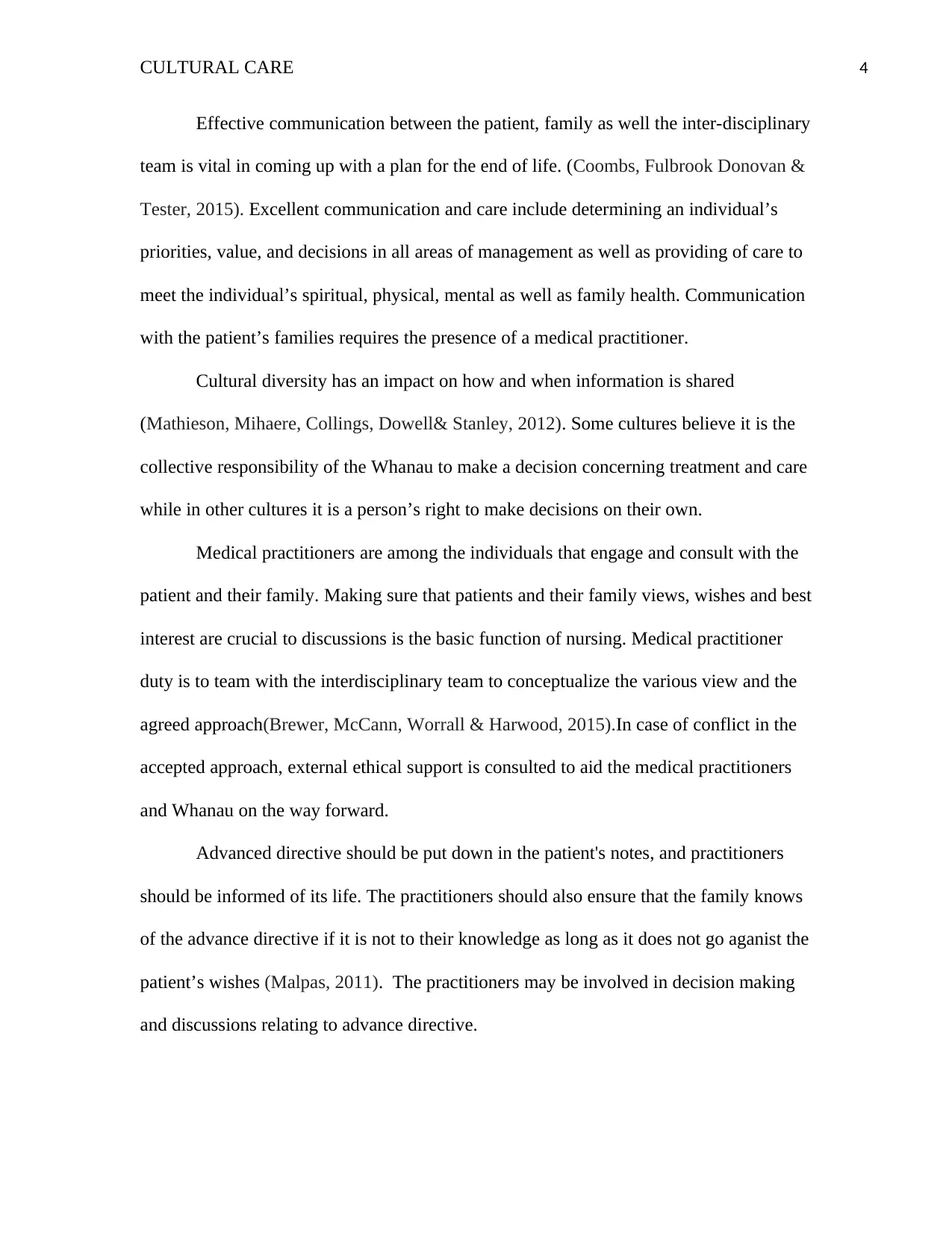
CULTURAL CARE 4
Effective communication between the patient, family as well the inter-disciplinary
team is vital in coming up with a plan for the end of life. (Coombs, Fulbrook Donovan &
Tester, 2015). Excellent communication and care include determining an individual’s
priorities, value, and decisions in all areas of management as well as providing of care to
meet the individual’s spiritual, physical, mental as well as family health. Communication
with the patient’s families requires the presence of a medical practitioner.
Cultural diversity has an impact on how and when information is shared
(Mathieson, Mihaere, Collings, Dowell& Stanley, 2012). Some cultures believe it is the
collective responsibility of the Whanau to make a decision concerning treatment and care
while in other cultures it is a person’s right to make decisions on their own.
Medical practitioners are among the individuals that engage and consult with the
patient and their family. Making sure that patients and their family views, wishes and best
interest are crucial to discussions is the basic function of nursing. Medical practitioner
duty is to team with the interdisciplinary team to conceptualize the various view and the
agreed approach(Brewer, McCann, Worrall & Harwood, 2015).In case of conflict in the
accepted approach, external ethical support is consulted to aid the medical practitioners
and Whanau on the way forward.
Advanced directive should be put down in the patient's notes, and practitioners
should be informed of its life. The practitioners should also ensure that the family knows
of the advance directive if it is not to their knowledge as long as it does not go aganist the
patient’s wishes (Malpas, 2011). The practitioners may be involved in decision making
and discussions relating to advance directive.
Effective communication between the patient, family as well the inter-disciplinary
team is vital in coming up with a plan for the end of life. (Coombs, Fulbrook Donovan &
Tester, 2015). Excellent communication and care include determining an individual’s
priorities, value, and decisions in all areas of management as well as providing of care to
meet the individual’s spiritual, physical, mental as well as family health. Communication
with the patient’s families requires the presence of a medical practitioner.
Cultural diversity has an impact on how and when information is shared
(Mathieson, Mihaere, Collings, Dowell& Stanley, 2012). Some cultures believe it is the
collective responsibility of the Whanau to make a decision concerning treatment and care
while in other cultures it is a person’s right to make decisions on their own.
Medical practitioners are among the individuals that engage and consult with the
patient and their family. Making sure that patients and their family views, wishes and best
interest are crucial to discussions is the basic function of nursing. Medical practitioner
duty is to team with the interdisciplinary team to conceptualize the various view and the
agreed approach(Brewer, McCann, Worrall & Harwood, 2015).In case of conflict in the
accepted approach, external ethical support is consulted to aid the medical practitioners
and Whanau on the way forward.
Advanced directive should be put down in the patient's notes, and practitioners
should be informed of its life. The practitioners should also ensure that the family knows
of the advance directive if it is not to their knowledge as long as it does not go aganist the
patient’s wishes (Malpas, 2011). The practitioners may be involved in decision making
and discussions relating to advance directive.
Paraphrase This Document
Need a fresh take? Get an instant paraphrase of this document with our AI Paraphraser
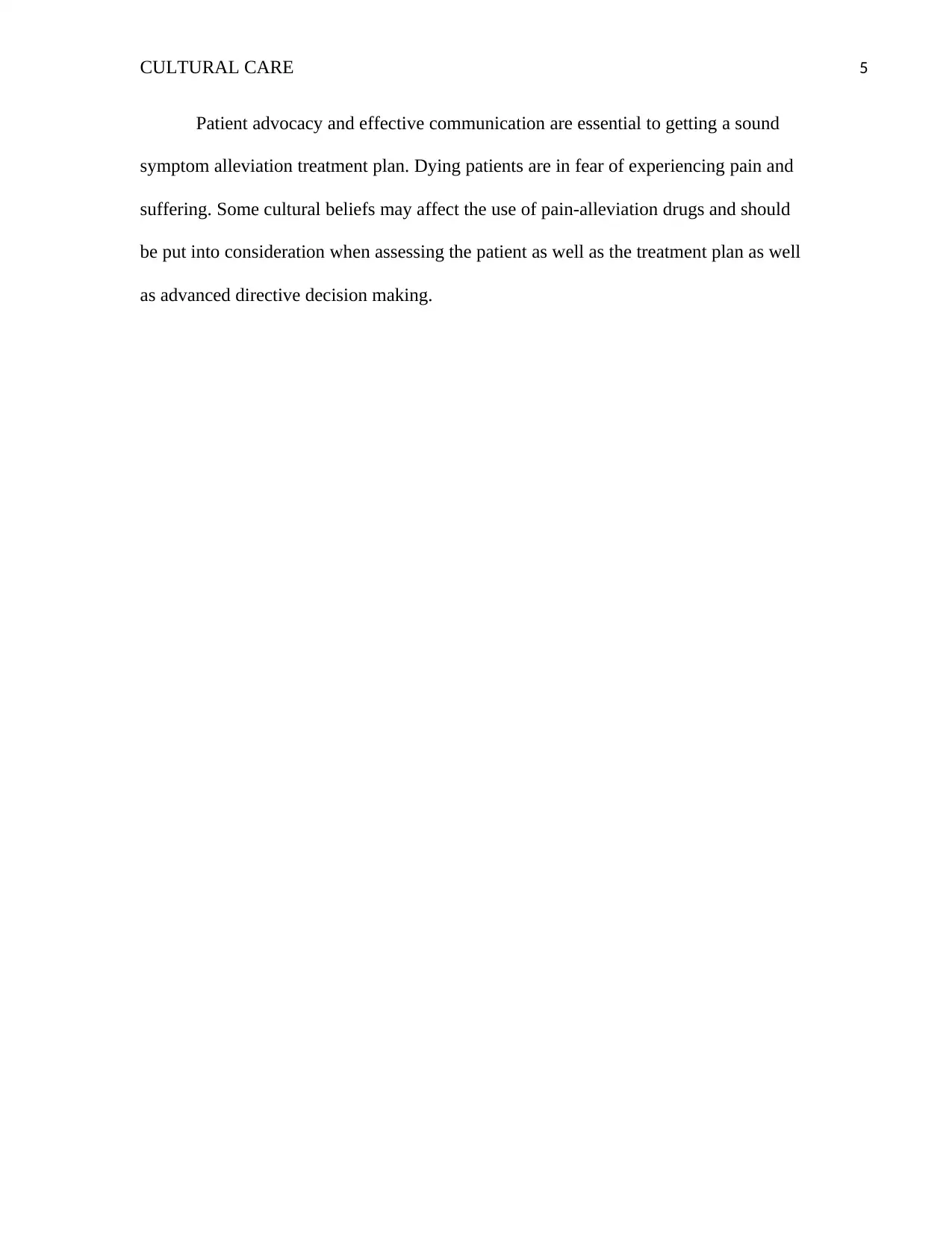
CULTURAL CARE 5
Patient advocacy and effective communication are essential to getting a sound
symptom alleviation treatment plan. Dying patients are in fear of experiencing pain and
suffering. Some cultural beliefs may affect the use of pain-alleviation drugs and should
be put into consideration when assessing the patient as well as the treatment plan as well
as advanced directive decision making.
Patient advocacy and effective communication are essential to getting a sound
symptom alleviation treatment plan. Dying patients are in fear of experiencing pain and
suffering. Some cultural beliefs may affect the use of pain-alleviation drugs and should
be put into consideration when assessing the patient as well as the treatment plan as well
as advanced directive decision making.
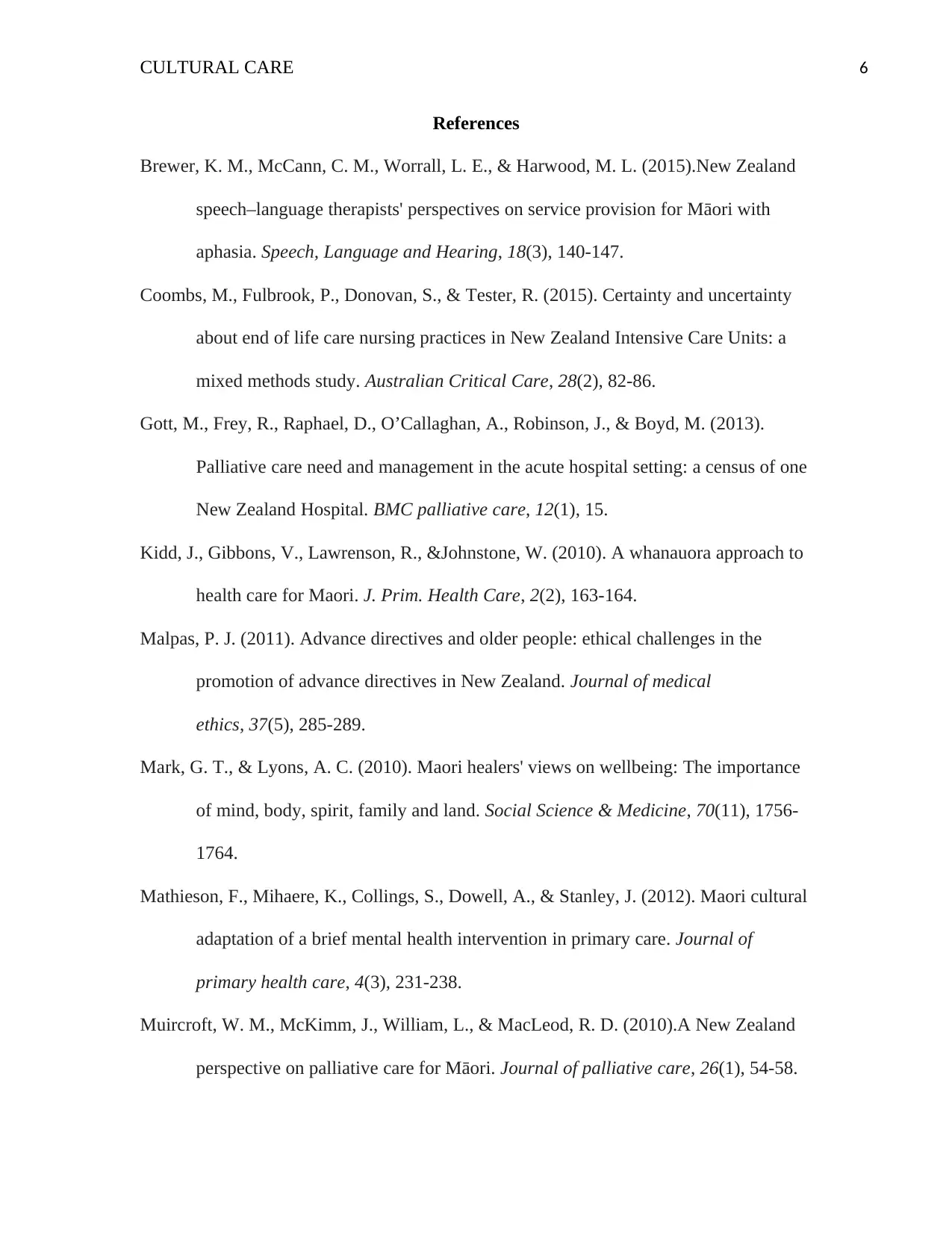
CULTURAL CARE 6
References
Brewer, K. M., McCann, C. M., Worrall, L. E., & Harwood, M. L. (2015).New Zealand
speech–language therapists' perspectives on service provision for Māori with
aphasia. Speech, Language and Hearing, 18(3), 140-147.
Coombs, M., Fulbrook, P., Donovan, S., & Tester, R. (2015). Certainty and uncertainty
about end of life care nursing practices in New Zealand Intensive Care Units: a
mixed methods study. Australian Critical Care, 28(2), 82-86.
Gott, M., Frey, R., Raphael, D., O’Callaghan, A., Robinson, J., & Boyd, M. (2013).
Palliative care need and management in the acute hospital setting: a census of one
New Zealand Hospital. BMC palliative care, 12(1), 15.
Kidd, J., Gibbons, V., Lawrenson, R., &Johnstone, W. (2010). A whanauora approach to
health care for Maori. J. Prim. Health Care, 2(2), 163-164.
Malpas, P. J. (2011). Advance directives and older people: ethical challenges in the
promotion of advance directives in New Zealand. Journal of medical
ethics, 37(5), 285-289.
Mark, G. T., & Lyons, A. C. (2010). Maori healers' views on wellbeing: The importance
of mind, body, spirit, family and land. Social Science & Medicine, 70(11), 1756-
1764.
Mathieson, F., Mihaere, K., Collings, S., Dowell, A., & Stanley, J. (2012). Maori cultural
adaptation of a brief mental health intervention in primary care. Journal of
primary health care, 4(3), 231-238.
Muircroft, W. M., McKimm, J., William, L., & MacLeod, R. D. (2010).A New Zealand
perspective on palliative care for Māori. Journal of palliative care, 26(1), 54-58.
References
Brewer, K. M., McCann, C. M., Worrall, L. E., & Harwood, M. L. (2015).New Zealand
speech–language therapists' perspectives on service provision for Māori with
aphasia. Speech, Language and Hearing, 18(3), 140-147.
Coombs, M., Fulbrook, P., Donovan, S., & Tester, R. (2015). Certainty and uncertainty
about end of life care nursing practices in New Zealand Intensive Care Units: a
mixed methods study. Australian Critical Care, 28(2), 82-86.
Gott, M., Frey, R., Raphael, D., O’Callaghan, A., Robinson, J., & Boyd, M. (2013).
Palliative care need and management in the acute hospital setting: a census of one
New Zealand Hospital. BMC palliative care, 12(1), 15.
Kidd, J., Gibbons, V., Lawrenson, R., &Johnstone, W. (2010). A whanauora approach to
health care for Maori. J. Prim. Health Care, 2(2), 163-164.
Malpas, P. J. (2011). Advance directives and older people: ethical challenges in the
promotion of advance directives in New Zealand. Journal of medical
ethics, 37(5), 285-289.
Mark, G. T., & Lyons, A. C. (2010). Maori healers' views on wellbeing: The importance
of mind, body, spirit, family and land. Social Science & Medicine, 70(11), 1756-
1764.
Mathieson, F., Mihaere, K., Collings, S., Dowell, A., & Stanley, J. (2012). Maori cultural
adaptation of a brief mental health intervention in primary care. Journal of
primary health care, 4(3), 231-238.
Muircroft, W. M., McKimm, J., William, L., & MacLeod, R. D. (2010).A New Zealand
perspective on palliative care for Māori. Journal of palliative care, 26(1), 54-58.
⊘ This is a preview!⊘
Do you want full access?
Subscribe today to unlock all pages.

Trusted by 1+ million students worldwide
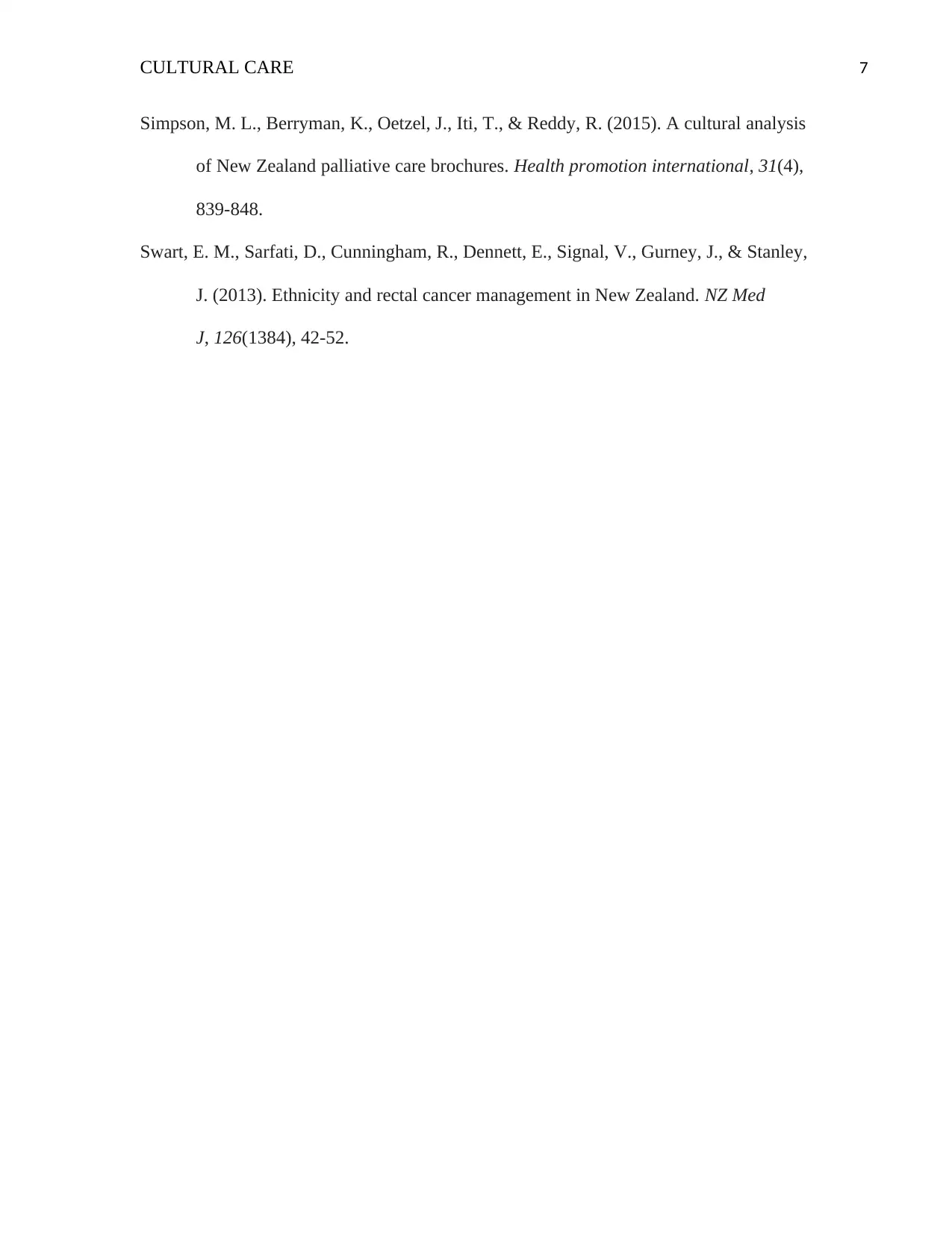
CULTURAL CARE 7
Simpson, M. L., Berryman, K., Oetzel, J., Iti, T., & Reddy, R. (2015). A cultural analysis
of New Zealand palliative care brochures. Health promotion international, 31(4),
839-848.
Swart, E. M., Sarfati, D., Cunningham, R., Dennett, E., Signal, V., Gurney, J., & Stanley,
J. (2013). Ethnicity and rectal cancer management in New Zealand. NZ Med
J, 126(1384), 42-52.
Simpson, M. L., Berryman, K., Oetzel, J., Iti, T., & Reddy, R. (2015). A cultural analysis
of New Zealand palliative care brochures. Health promotion international, 31(4),
839-848.
Swart, E. M., Sarfati, D., Cunningham, R., Dennett, E., Signal, V., Gurney, J., & Stanley,
J. (2013). Ethnicity and rectal cancer management in New Zealand. NZ Med
J, 126(1384), 42-52.
1 out of 7
Related Documents
Your All-in-One AI-Powered Toolkit for Academic Success.
+13062052269
info@desklib.com
Available 24*7 on WhatsApp / Email
![[object Object]](/_next/static/media/star-bottom.7253800d.svg)
Unlock your academic potential
Copyright © 2020–2026 A2Z Services. All Rights Reserved. Developed and managed by ZUCOL.





